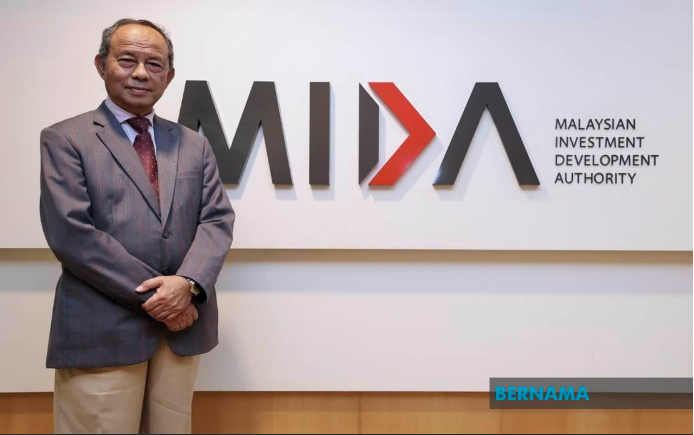MIDA TO ATTRACT INVESTMENTS BY FOSTERING ROBUST, SUSTAINABLE ECONOMIC ENVIRONMENT

The Malaysian Investment Development Authority (MIDA) aims to foster a robust, sustainable, and resilient economic environment to attract and retain significant investments, driving Malaysia towards a prosperous future.
Chairman Tan Sri Dr Sulaiman Mahbob said the competition for global investments is intensified, leaving no room for complacency.
“Building on our current momentum and facing the challenges ahead, the Ministry of Investment, Trade and Industry (MITI) and MIDA are poised to take on a more dynamic and engaging role in 2024,” he said in his keynote address at the National Investment Seminar: Re-energising Domestic Investment.
He said MIDA's primary focus will be on the comprehensive implementation of all government initiatives and mandates to achieve the desired outcomes aligned with the national agendas, namely the 12th Malaysia Plan, the MADANI Economy Framework, the New Industrial Master Plan 2030, and the National Energy Transition Roadmap.
Sulaiman said that to thrive amid the complex and global challenges, Malaysia must embrace innovation and develop new solutions continuously.
“Recognising the vital role of small and medium enterprises (SMEs) in Malaysia's economy, MITI and MIDA are committed to empowering these businesses.
“We aim to boost productivity, encourage technology adoption, and enhance competitiveness in local and international markets. We remain steadfast in supporting SMEs on their growth journey,” he said.
Sulaiman said MIDA is bolstering local companies' capabilities to integrate into the global supply chain, a vital move for industries such as integrated circuit design, where local expertise and innovation can catapult Malaysia onto the world stage.
The agency is aligning its strategies with environmental, social and governance (ESG) principles to attract high-value, innovative, quality, and sustainable investment projects, he said.
“We are keen to collaborate with partners focused on 'impact investing'. Our goal is to empower the local supply chain, support companies in automating processes, and enhance cost-efficiency while meeting industry demands and mitigating social and environmental impacts,” he said.
He added that both foreign investment (FI) and domestic investment (DI) performance should be viewed not only as opportunities to unlock financial returns but also to improve social and environmental outcome.
Meanwhile, Sulaiman said MIDA also has a dedicated SME Investment Desk to facilitate and coordinate its support services for Malaysian businesses.
For the January-March 2024 period, MIDA has organised 14 programmes and has reached out to more than 420 SMEs throughout Malaysia.
“MIDA will work closely with companies as well as key partners such as the Federation of Malaysian Manufacturers (FMM) to foster a more conducive business environment and increase growth opportunities.
“The facilitation efforts enable businesses to scale up operations, improve supply chain capabilities, adopt cutting-edge technologies, and enhance competitiveness in both domestic and global markets,” he said.
Meanwhile, FMM vice president Jacob Lee, in his welcome remarks at the seminar, highlighted the importance of strong domestic investments, saying that strong domestic demand results in more DIs and a healthy DI is essential for successful FI.
“Domestic investments usually create more jobs, and this arises from the small and medium industries which provide employment opportunities and provide continuous opportunities to local industry players to expand their businesses,” he said.
Lee noted that FIs and DIs complement one another, adding that the transfer of knowledge from foreign investments and the need for a robust domestic industry to support FI businesses lead to innovation and the growth of domestic businesses.
“In time and with the proper support, these domestic businesses can move beyond playing a supporting role to FI and can compete internationally to build the Malaysian brand overseas,” he added.
